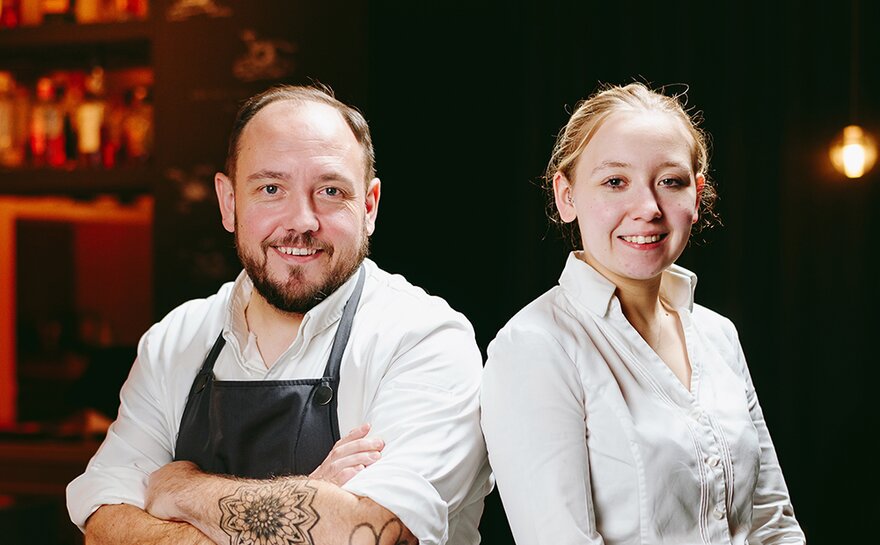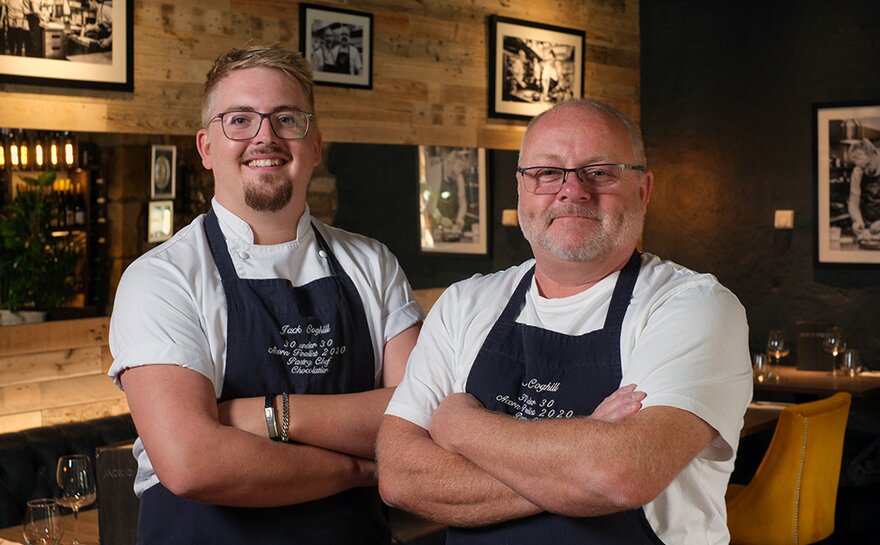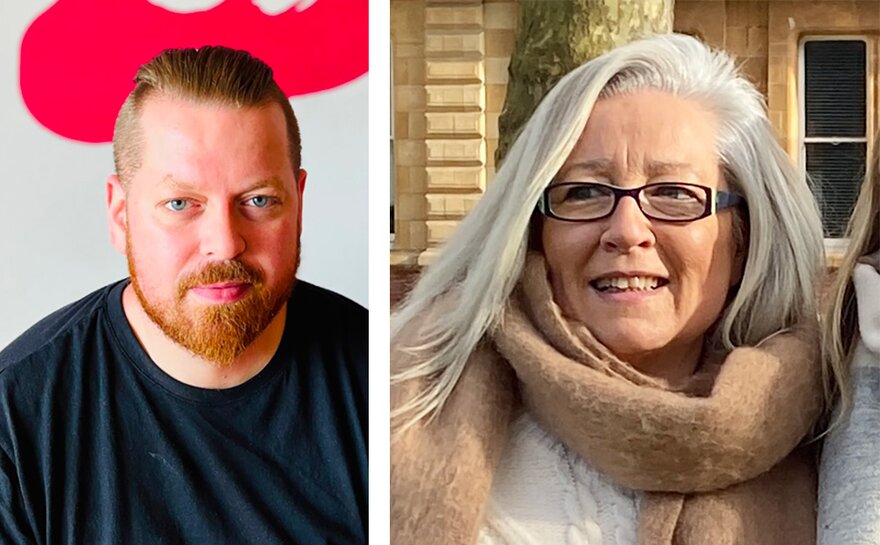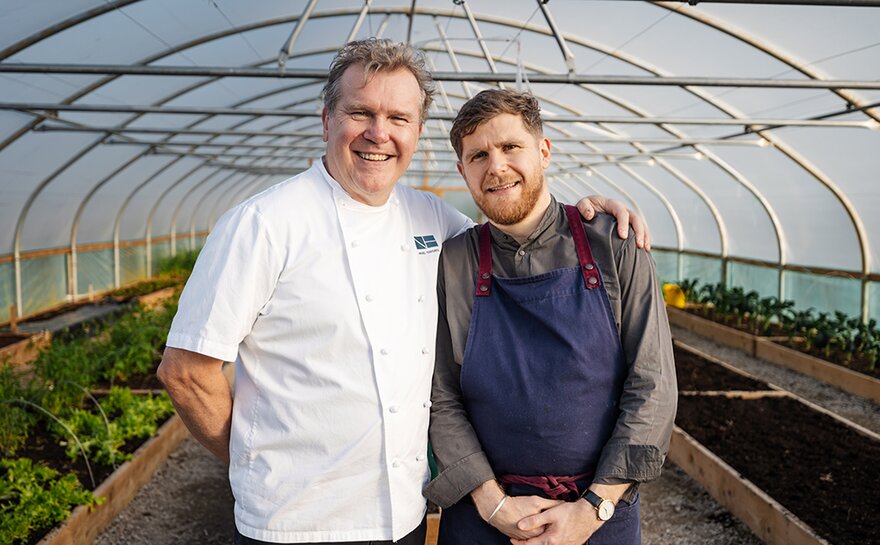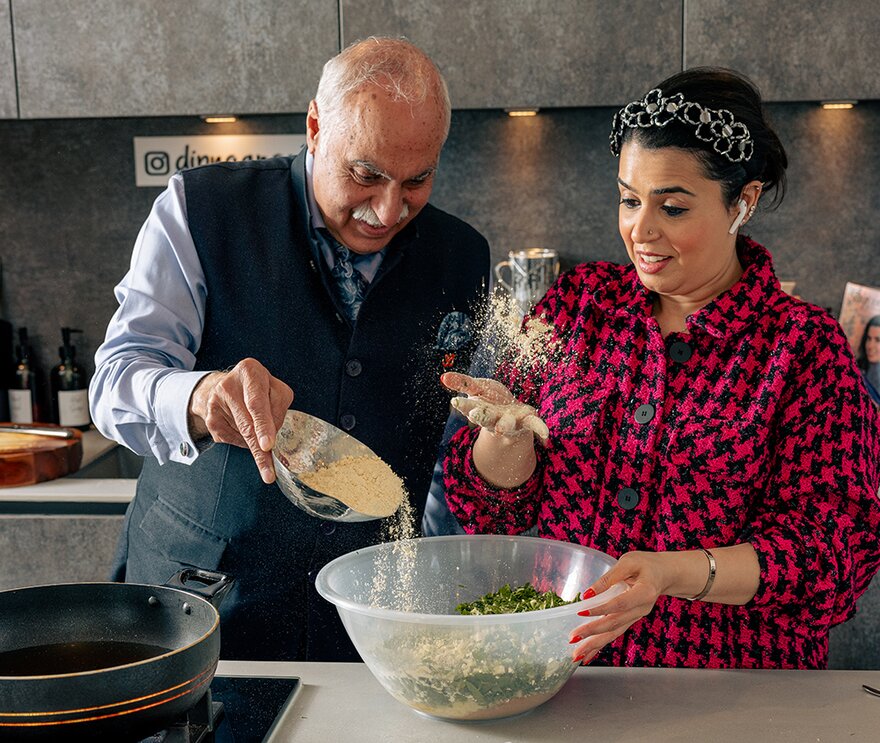Five pairs of multi-generational restaurateurs explain the highs and lows of working with your nearest and dearest
James and Georgia Sommerin
Home is an incredibly apt name for James Sommerin's one-Michelin-starred restaurant in Penarth, South Wales, as he shares the kitchen with his daughter, Georgia.
James started cooking from the age of 12, inspired by his own elders, mainly his grandmother, and after a brief stint at university, Georgia followed in his footsteps and joined his team at Home.
But it wasn't just her father who inspired her: "My mum used to bake at home and I used to cook with my nanny, so I've always loved cooking," says Georgia.
She recalls dining at the Crown at Whitebrook for her eleventh birthday – her first Michelin dining experience where her dad was the head chef – and how her entry into the hospitality world started by working with him on a Saturday to earn pocket money.
But as she got further involved with her dad's kitchen, she realised professional cooking was her passion.
"I loved pastry to start off with. Then, because me and my dad had a really good relationship in the kitchen – we just flow and work easily around each other – that was it really. It's a bit like a drug, this industry, you get attached and then it's hard to let go of it."
James puts their excellent kitchen relationship down to Georgia's training with him: "We're both quite similar in how we work. She mirrors what I do. She learned habits – and bad habits – from me, and she has only ever worked in a one-star kitchen headed up by me."
But he's under no illusion that Georgia won't go her own way one day – he just hopes it'll be within their family business. "Georgia is a business partner within the restaurant, she has a vested interest in it, for it to do well and to take the reins to develop the business slightly differently. It's a little different to being cut-and-dried chefs – we are running a business, so you have to have as much passion for the management side of things as being behind the stove."
Does Georgia think she's up to the job? She's certainly keen for the challenge, and hopes one day she'll be able to get the restaurant its second Michelin star.
Bryan and Jack Coghill
It was set in the stars that Bryan Coghill's offspring would join him in the kitchen, even before he knew he and his wife were having his son Jack.
Cooking has always been a family affair for Bryan, as he worked alongside his own father in his early career. "I had my first restaurant at 19 years old in the Canary Islands," Bryan explains. "And I suppose it was always going to be a family business as I got the chance to train my father as a chef during that time."
He describes the experience of training his father to be "strenuous at times", but they worked together for many years so "it can't have been that bad". And it seems he's still got the knack to inspire, as today he runs Jack O'Bryan's – a Dunfermline-based restaurant in Scotland – with his son, Jack.
"I was basically chained and dragged into the kitchen," jokes Jack, the sort of banter that gets them through the day, he says. While cooking with his dad can be tense at times, he's grateful for it as ultimately they have each other's back more because of their close bond.
The pair have such a strong working relationship, in fact, that they've got big plans for the future. "We're developing a cookbook," says Bryan. "But I also want to give Jack the chance to develop the business – he has the skills and the energy. Us old dinosaurs, we eventually have to give the younger ones the space to let them carry the industry forward."
Jack wants to continue working with his good friend Mark Tilling, winner of Bake Off: Creme de la Creme, and has his sights set on a slot on James Martin's Saturday Morning. The pair even joked about doing their own TV show together before Bryan retires. But Bryan has no plans for stepping back anytime soon – especially as he's waiting for his granddaughter to grow up so he can train her up too, making it four generations in his kitchen.
Jason Curtis and Deb Widger
Deb Widger, former owner of the award-winning Old Embassy House hotel in Fowey, inspired her son's entry into hospitality after he watched her working behind the bar at Dormy House, a hotel in the Worcestershire Cotswolds when he was younger.
Deb was a single mother and would bring Jason to work with her when childcare was unavailable, instilling in him her steadfast work ethic and a deep intrigue for the hospitality industry. "I'd have Marmite Mini Cheddars and a glass of ginger beer, which at four years old is quite bougie," says Jason. "Then I used to go in the kitchen, where John Chandler was head chef at the time, and the woman on the dessert station would let me nick a few pillow chocolates."
These fond memories – and the influence of his kitchen garden-growing grandparents – turned into a passion for creating fine food. His career took him into Michelin-starred kitchens and across the world to Australia to train in cooking seafood.
Today, Jason runs a small café called CJ's at the centre of the south Oxfordshire village he now lives in, but his mum's influence remains: "Old Embassy House was steampunk meets Cornish style, and at CJ's we're going with similar vibes, with minimalist design and scaffolding shelves."
That and his passion for creating a welcoming and equality-driven workplace for his staff – something he knows is important after hearing horror stories from his mum's early days in the industry – is something he has her to thank for.
Nigel and Kirk Haworth
Nigel Haworth and his son Kirk work in kitchens over 200 miles apart, each with their own distinct mission. Nigel's Lancashire pub, the Three Fishes, serves farm-to-fork food supplemented by its one-acre kitchen garden – think hand-dived Hebridean scallops and hearty barbecued pork rump – while Kirk's London restaurant, Plates (currently closed for relocation), and food studio is a creative hive for plant-based cookery. Their differences and distance apart might be great, but their closeness as father and son chefs remains steadfast – as it has done throughout much of their careers.
Nigel describes himself as a failed footballer – "I was never going to make it at the highest level" – and so cooking was the next best thing. "Cookery just seemed to appeal to me, and from that moment on I enjoyed working with food," he says. His parents discouraged him, worried it would be detrimental to future marriage, what with the industry keeping such unsociable hours, but when it came to Kirk wanting to pursue his own path in the kitchen, Nigel didn't pass on such warnings – instead, he encouraged him: "I got him a little pot-washing job [in Northcote , Lancashire, which he co-founded with Craig Bancroft] and from that moment on, he got the bug. It's really quite special."
Kirk doesn't recall being inspired by his dad to get into cooking, despite spending hours in restaurants watching him work, but rather says that he slowly came to it after graduating from pot-washer to canapé constructor: "On the breakfast shifts, I'd scrub the scrambled eggs off the bottom of the pans and it was horrendous, so I thought if I can not do that again, I'll be winning."
Cooking certainly changed his relationship with his father, though, as he began to learn what it really takes to be a successful chef. "It was interesting," Kirk says, "because growing up I went from hearing my mum say ‘oh, your dad's working' all the time and not really understanding what she meant, to then having this incredible amount of respect when I actually saw how hard my dad worked to achieve everything.
"When your father is in the same industry as you, they're the main person you want to make proud, so I always wanted to impress my dad with my dishes, because he understood it more than anyone else."
Their relationship has been consistent, says Nigel, and often revolved around cooking and running kitchens, and generally it has been easy to work together. However, there was one period which they both found incredibly challenging: "When Kirk got back from Australia and was suffering from Lyme disease, it was a really tricky time," explains Nigel. "None of us realised what the illness was doing to him."
Kirk had chronic pain, memory loss, fatigue, persistently stinging eyes and gut health issues after contracting the condition while abroad. It was often intense between them in the kitchen as Kirk took his pain out on his dad. It was this, though, that led Kirk to establishing his plant-based kitchen. After hours spent in consultant's offices he was spurred on to take control of his disease through the only way he knew how: with health-conscious, plant-based food.
Today, the respect Kirk has for his father goes both ways. Nigel now relies on Kirk for inspiration on all things vegan, often calling his son for help with any new plant-based dishes he wants to put on the menu at the Three Fishes.
Dipna and Gulu Anand
Dipna and Gulu Anand have become something of their own brand on the internet these days, with Dipna's Tiktok followers begging her for more content with her dad when he doesn't appear in her videos. But the Anand family's kitchen story doesn't begin with these two – it all started in the 1950s when Bishen Dass Anand, Gulu's father, opened the first Brilliant restaurant in Nairobi, Kenya. Gulu joined his father in the kitchen from a young age and, in 1975, he opened up his own branch of Brilliant in London with his brother, Kewal.
"It's fair to say that cooking is in my blood," says Dipna. "I was brought up in a family of chefs and restaurateurs. When I was growing up I had all these ideas of what I wanted to do – I think at one point I wanted to be a vet and another I wanted to be a cricketer – but food was definitely my passion."
She recalls watching over her father running the restaurant and kitchen and feeling inspired, but he wasn't her only influence: "At home I had a keen interest in watching my mum cook." As she got older and more capable, her weekends were spent helping out at the restaurant, and she always looked forward to it. At school, Dipna wasn't much of an academic but her vocational skills, particularly in food technology, were unparalleled – so much so, she won a national award for her A-Level project on healthy Indian cuisine.
"In times before," says Gulu, speaking about his daughter's chosen career path, "people wanted their sons or daughters to become engineers or doctors. Nobody wanted them to become chefs, but now the country needs that. Catering is the biggest industry in the world, and I am very, very lucky that my children are in this same field as me."
While much of Gulu's training came from his father, who cooked traditional Indian dishes using traditional methods, Dipna went off to study cooking and gain formal qualifications to give her the best understanding of the industry. While the meeting of old and new can sometimes create friction, Gulu says it's been a positive learning curve for him, too: "With their new ideas and thinking, they've [Dipna and Shanker] brought a fantastic aspect to the cooking. I still argue with them, yes – I am an old-school boy –but the new methods and techniques they use are fantastic at saving us lots of time and space and, production-wise, it's amazing."
"The most fun time is when me, my dad and my brother are all in the restaurant at once," says Dipna. "And yes we do have different opinions, but we come to a compromise and those are the things that make us stronger."
Continue reading
You need to be a premium member to view this. Subscribe from just 99p per week.
Already subscribed? Log In

